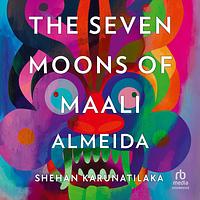Take a photo of a barcode or cover
Like an acid trip of death with an unreliable narrator. A good read.
This was absolutely stunning. By far one of the most beautiful, engaging and unexpected stories I’ve read. I didn’t see it coming and I adored it.
medium-paced
Plot or Character Driven:
A mix
Strong character development:
N/A
Loveable characters:
No
Diverse cast of characters:
No
challenging
emotional
funny
reflective
medium-paced
Plot or Character Driven:
Character
Strong character development:
Yes
Loveable characters:
Complicated
Diverse cast of characters:
Complicated
Flaws of characters a main focus:
Yes
adventurous
challenging
dark
emotional
funny
informative
reflective
sad
tense
fast-paced
Plot or Character Driven:
A mix
Strong character development:
Yes
Loveable characters:
Yes
Diverse cast of characters:
Yes
Flaws of characters a main focus:
No
informative
reflective
I picked up The Seven Moons of Maali Almeida wanting a substantially provoking read. I was not disappointed. One of my more cerebral books of the year, I cannot say it was an easy read. But please, for the love of god (she's probably watching), persevere.
The novel is divided into the seven ‘moons’ (days) our un-alived protagonist, the controversial closet-case war photographer Maali Almeida, has to expose the atrocities of the Sri Lankan civil war and bring his murderers to justice, before he enters ‘the Light’.
Karunatilaka’s worldbuilding is unmatched, devising a creatively complex interpretation of the afterlife, with ghosts, ghouls, demons and all. They leave no strings loose, delving into the metaphysics of a world where ghosts can whisper to humans. That voice one hears lodged deep in the subconscious, breaths that guide actions or poison with doubt. In the traumatised body-disposer Drivermalli, the author even alludes to the apparitions of schizophrenia.
The seamless integration of Sri Lankan political landscape, queer life and this fantastical concept, enabled Karunatilaka to understand a confusingly tumultuous context through flawed and lovable characters. It required a detailed understanding of the intersecting tensions of the civil war and its warring factions, which he infused his corrupt and entangled officials with. And while I commend Karunatilaka for putting in the work to fictionalise this history I was yet unbeknown to, this thick political jargon contributed to my early confusion. The main plot for our brazen hero delivers an antiwar narrative that quite realistically, does not eventuate.
TSMOMA speaks to the nuance of queer existence in homophobic contexts. Despite Maali’s closeted label, he is unapologetic about his sexuality and extra-monogamous relations. I think the strength of queerness always evades the forces attempting to tear it down. The strength of Maali to die for his love. I believe it would risk presentism to take Maali’s queerness out of context and ascribe Karunatilaka to the coming-out criticism. A photographer, gambler, lover, and friend, Maali stands for the complex queer characters our reading community calls for.
I think Karunatilaka’s impeccable style is what makes all these disparate elements co-exist within the technicolour binding. Like a noose, each ‘scene’ resolves beautifully, sometimes with gut-wrenching bluntness. Its actionable pace is unpredictable and captivating, while the stunning descriptiveness makes intelligible the difficult tensions.
The novel is divided into the seven ‘moons’ (days) our un-alived protagonist, the controversial closet-case war photographer Maali Almeida, has to expose the atrocities of the Sri Lankan civil war and bring his murderers to justice, before he enters ‘the Light’.
Karunatilaka’s worldbuilding is unmatched, devising a creatively complex interpretation of the afterlife, with ghosts, ghouls, demons and all. They leave no strings loose, delving into the metaphysics of a world where ghosts can whisper to humans. That voice one hears lodged deep in the subconscious, breaths that guide actions or poison with doubt. In the traumatised body-disposer Drivermalli, the author even alludes to the apparitions of schizophrenia.
The seamless integration of Sri Lankan political landscape, queer life and this fantastical concept, enabled Karunatilaka to understand a confusingly tumultuous context through flawed and lovable characters. It required a detailed understanding of the intersecting tensions of the civil war and its warring factions, which he infused his corrupt and entangled officials with. And while I commend Karunatilaka for putting in the work to fictionalise this history I was yet unbeknown to, this thick political jargon contributed to my early confusion. The main plot for our brazen hero delivers an antiwar narrative that quite realistically, does not eventuate.
TSMOMA speaks to the nuance of queer existence in homophobic contexts. Despite Maali’s closeted label, he is unapologetic about his sexuality and extra-monogamous relations. I think the strength of queerness always evades the forces attempting to tear it down. The strength of Maali to die for his love. I believe it would risk presentism to take Maali’s queerness out of context and ascribe Karunatilaka to the coming-out criticism. A photographer, gambler, lover, and friend, Maali stands for the complex queer characters our reading community calls for.
I think Karunatilaka’s impeccable style is what makes all these disparate elements co-exist within the technicolour binding. Like a noose, each ‘scene’ resolves beautifully, sometimes with gut-wrenching bluntness. Its actionable pace is unpredictable and captivating, while the stunning descriptiveness makes intelligible the difficult tensions.
dark
mysterious
medium-paced
Plot or Character Driven:
Plot
Not only its a tale of ghost looking for his murderer, more than that the book tells the story of a country torn by separatism, racism, and race of power in the region.
I enjoy Karunatilaka’s writing style, its blunt, honest, cynical, brutal, yet it is honest/the truth.
I was going to give it more stars, but then, Karunatilaka is pushing the queer hero thing.
I enjoy Karunatilaka’s writing style, its blunt, honest, cynical, brutal, yet it is honest/the truth.
I was going to give it more stars, but then, Karunatilaka is pushing the queer hero thing.





